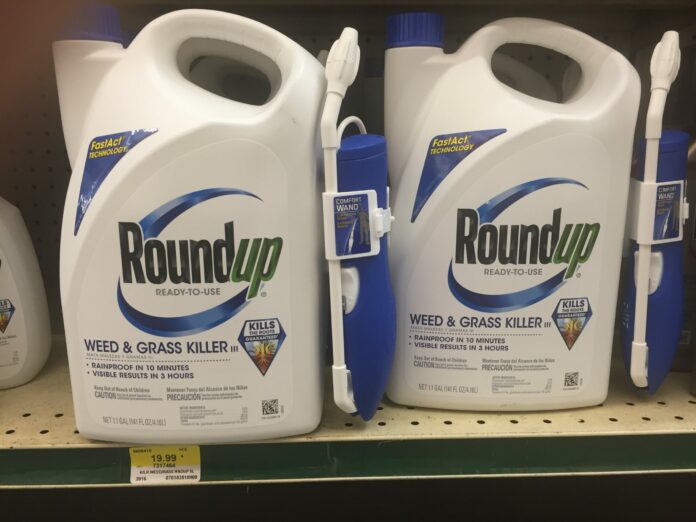Directors of the San Lorenzo Valley Water District have invited the public to an environmental committee meeting at 10 a.m. in May 3 to discuss a plan to use glyphosate, an herbicide that last month was labeled carcinogenic by the state of California.
When Richard Moran, a citizen member of the board’s environmental committee, said at the April 20 meeting that the public needed to know about growing opposition to glyphosate by governments, health agencies and water and school districts, Water board President Gene Ratcliffe said, “Those decisions were not based on science.” Director Chuck Baughman agreed, and cautioned against a “gut reaction” to glyphosate, which he called “benign and tolerable.”
How dangerous is glyphosate?
Glyphosate, introduced in the 1970s, is the most widely used herbicide in the world, sprayed on farms, in forests, parks, on roadsides and in gardens. It is the most active ingredient in the common weed killer Roundup, produced by Monsanto.
More than 10 million pounds of glyphosate are applied in California each year, according to government figures.
The San Lorenzo Valley Water District is considering a plan to apply the herbicide to 19,000 French Broom plants in the 180-acre Olympia Watershed in Felton.
In 2015, 17 leading global cancer experts from the World Health Organization’s International Agency for Research on Cancer unanimously classified glyphosate as a class 2A “probable human carcinogen.”
The organization also observed that non-Hodgkin lymphoma and other hematopoietic cancers are the cancers most associated with glyphosate exposure.
The World Health Organization’s cancer research agency is widely considered the gold standard for research on cancer.
The Californian Office of Environmental Health Hazard Assessment on March 28 declared that glyphosate will be added to the list of chemicals known to the state to cause cancer for purposes of Proposition 65.
The California announcement last month was historic. It was the first U.S. regulatory body to act on glyphosate. Several water districts, cities and school districts in the state had banned glyphosate and other herbicides.
“When it comes to Roundup, California has become a national leader in flagging the very real danger posed by this vastly over-used pesticide,” said Nathan Donley, a senior scientist at the Center for Biological Diversity and a former cancer researcher. “The state based its decision on the findings of the world’s most reliable, transparent and science-based assessment of glyphosate.”
“It’s great to see democracy is alive and well in California where judges are still willing to stand up for science, even against the most powerful corporate polluters. This decision gives Californians the right to protect themselves and their families from chemical trespass,” wrote Robert F. Kennedy Jr. Kennedy is representing 235 plaintiffs (45 from California) who are suing Monsanto for non-Hodgkin lymphoma from exposure to Roundup.
The listing of glyphosate as a carcinogen in California is a warning to consumers, not a ban. Still, environmental leaders say they are counting on the move to tilt debates over its use.
In 1986, California voters approved the Safe Drinking Water and Toxic Enforcement Act, better known as Proposition 65, which requires the state to publish a list of chemicals known to cause cancer or birth defects. This list has grown to include approximately 800 chemicals.
Monsanto had gone to court and unsuccessfully tried to block the state from making its declaration. A case in federal court in San Francisco against Monsanto included Monsanto’s internal emails and email traffic between the company and federal regulators that suggested that Monsanto had ghostwritten research that was later attributed to academics. The documents also indicated that Monsanto had successfully pressured the U.S. Department of Health and Human Services to drop a glyphosate review.
Further evidence that Monsanto and other glyphosate manufacturers funded research on the public health impacts of glyphosate in order to keep the controversial substance on the market were revealed in a new report released last month by a dozen European environmental advocacy organizations.
According to the report, between 2012 and 2016 the glyphosate manufacturers sponsored a series of review articles published in scientific journals, all of which conclude that glyphosate and its commercial formulations are not harmful to health.
The March report, “Buying Science,” showed that the industry-sponsored reviews of glyphosate’s carcinogenicity and genotoxicity (ability to damage DNA) contain fundamental scientific flaws, from apparently calculated omissions and the introduction of irrelevant data to the violation of Organization for Economic Cooperation and Development guidelines for the evaluation of cancer studies. The industry-funded reviews also consistently assigned greater weight to unpublished industry studies than to studies that were peer-reviewed and published in scientific journals.
“Glyphosate producers have used every trick in the book to enable regulatory authorities around the world to play down the alarming health effects of glyphosate. The fact that the agencies accepted their ‘assistance’ is nothing less than scandalous,” says Helmut Burtscher, one of the study’s authors.












